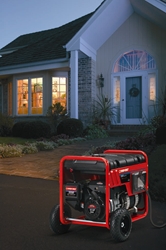Storm Preparedness: Be Prepared for Seasonal Storms

It seems that every day another weather story makes the news. From flooding rains and high winds to that final ice storm that knocks out the power - weather can affect us wherever we live with very little warning. The good news is, there are ways to prepare for severe weather before it happens.
Here are some tips on what you can do before and after the storm to limit the affect weather will have on your yard, home and lifestyle.
- Consider purchasing a generator. The on-call power of a generator - either portable or permanently installed - can take over during a power outage, keeping important appliances such as your sump pump, refrigerator and freezer running. Learn more about how to select a generator for your home.
- Remove dead tree branches. They can break off in a storm, posing a danger to people as well as your car, deck and other items in the yard. Cut back branches that overhang your house. A fallen branch can do costly damage to the roof or siding, and overhanging tree limbs deposit seeds and leaves in your gutters, potentially clogging them and causing overflow in a storm.
- Keep your gutters clean. This can be a twice-a-year project depending on how many trees are near your home. The seed pods of many trees can clog gutters during spring; leaves are the obvious problem in fall. You can add the gutter debris to your compost pile.
- Fix drainage problems in your yard. They won't go away on their own. Landscape and grading experts can offer possible solutions to even the toughest drainage issues. Solutions range from adding soil to low areas, to creating a French drain or installing plastic drainage pipes to draw water away from where it stands. Lawn that is under water for more than a few days will suffocate and die, creating a recurring problem unless the underlying issue is addressed.
- Don't work in your yard when a storm is in the area. Thunderstorms can be very dangerous, even if they seem miles away. If you hear thunder, stop mowing, raking, or whatever you are doing in the yard and seek shelter. Don't rush to complete a task - lightening can strike long before the rain starts. After you hear the last thunderclap, wait 30 minutes before going back outside.
- Pick up yard debris. When the storm has passed, assess any damages in your yard. Remove broken tree limbs and pick up windblown debris immediately to avoid injuries and to limit your yard clearing duties the next time you mow.
The weather is always unpredictable, but by taking a few steps to prepare, we can avoid some of those harrowing storm stories.
TROUBLESHOOTING FAQS
View solutions for handling the most common engine and product troubleshooting and maintenance questions.
VIDEOS
Learn about the latest products by Briggs & Stratton, step-by-step instructions on how to locate your lawn mower engine model number and more!


